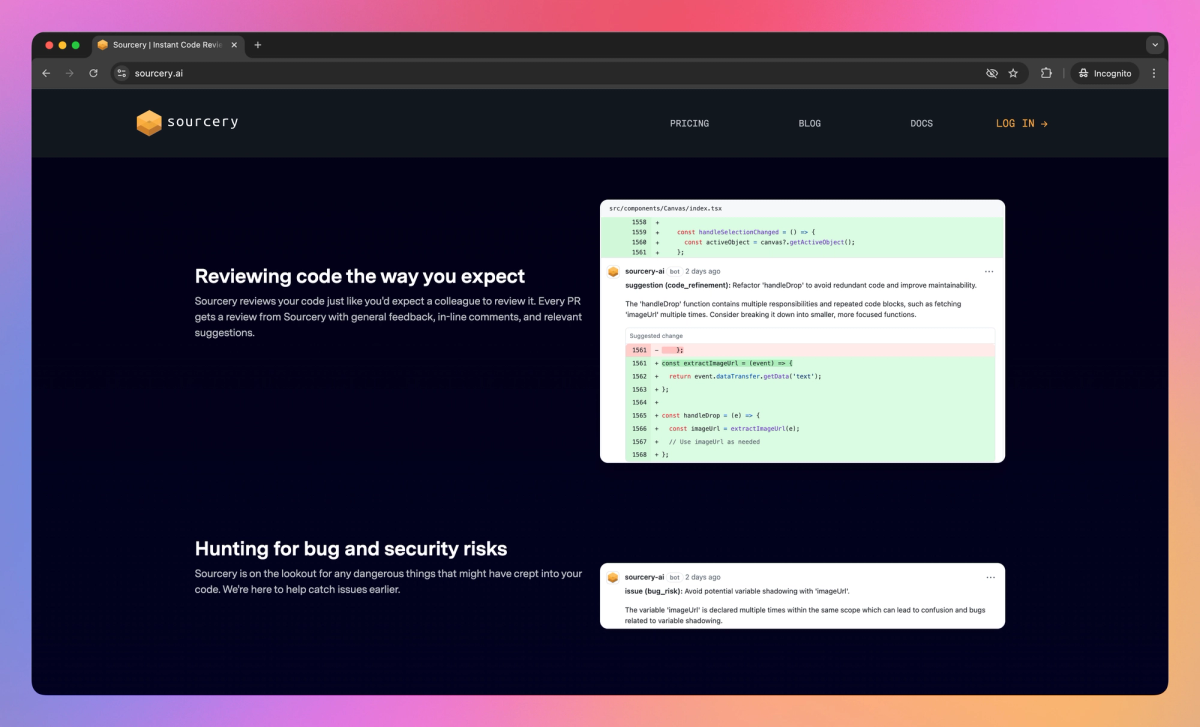

What is Sourcery?
Sourcery is an AI code reviewer that integrates with GitHub repositories, examining every pull request automatically. It provides software engineers with immediate feedback on code quality, suggesting improvements and identifying potential issues in their pull requests.
What sets Sourcery apart?
Sourcery stands out by focusing on complexity reduction in codebases. It helps software engineering teams catch and fix overly complicated logic, making maintenance easier down the line. By promoting cleaner code architecture, Sourcery allows developers to spend more time on creative problem-solving.
Sourcery Use Cases
- AI code reviews
- Automated refactoring suggestions
- Code quality improvement
- Continuous code analysis
Who uses Sourcery?
Software Architects Engineering Managers Software Engineers Machine Learning Engineers Dev Ops Engineers Software Testers IT Project Managers Chief Technical Officers Data Engineers Backend Software Engineers Frontend Software Engineers Quality Assurance Engineers Fullstack Developers Software Developers Test Automation Engineers
Features and Benefits
- Sourcery reviews every pull request, providing feedback and suggestions to improve code quality.
Automated code review
- Sourcery uses artificial intelligence to identify potential bugs, security risks, and code complexity issues.
AI-powered analysis
- Sourcery integrates directly with GitHub repositories to provide instant code reviews on pull requests.
GitHub integration
- Sourcery supports code review for multiple programming languages, expanding its utility across different projects.
Multi-language support
- Users can create custom review rules to tailor Sourcery's analysis to their specific project needs and coding standards.
Customizable rules
Sourcery Pros and Cons
Pros
Improves Python code quality through automated refactoring
Easy to configure with customizable rules
Helps simplify complex code structures
Responsive customer support for feature requests
Cons
May prioritize code compactness over readability
Can generate overly complex one-liners
Limited to Python language support
Some refactoring suggestions may conflict with linter rules
Pricing
Free TrialOpen Source Price not available
Free for Open Source projects
GitHub reviews for Open Source Code
GitLab Reviews for Open Source Code
Unlimited reviews on public repos
In IDE Coding Assistant for Open Source Code
Automated Fixes for Open Source Code
Whole File Analysis for Open Source Code
Unlimited Custom Rules
IDE Integrations for public repos
GitHub Integration for public repos
CLI for public repos
CI/CD Integration for public repos
Pre-commit Hook for public repos
Pro $24/mo
Use for any project
Code review for private repos
Pull request summary
Line by line review
Custom review rules
Team management
Unlimited reviews per month
In IDE Coding Assistant
Automated Fixes
Whole File Analysis
Unlimited Custom Rules
IDE Integrations
GitHub Integration
CLI
CI/CD Integration
Pre-commit Hook
Enterprise Price not available
Includes everything in Pro
Self hosting option
Priority support
Customer success manager
Invoice billing
Unlimited reviews per month
Unlimited Custom Rules
IDE Integrations
GitHub Integration
CLI
CI/CD Integration
Pre-commit Hook
Team management
Dedicated Account Manager








